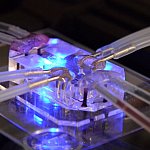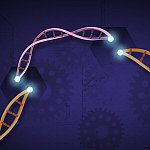You are here
Transformative Technologies
In a cyclic fashion, technology drives science, and science creates technologies to tackle scientific problems as they arise. Technology development often requires input from many times of minds, including not only biologists and chemists but also mathematicians, engineers, and computer scientists. 21st Century biomedicine is a hotbed of discovery of new devices and tools that promise to revolutionize health.
« Previous: The Future of Biomedicine Next: Research for Healthy Living »
This page last reviewed on November 16, 2023




